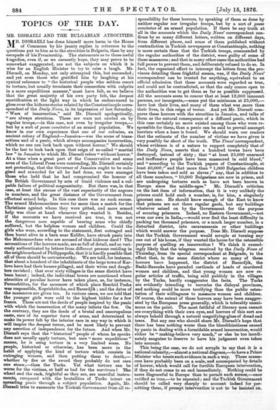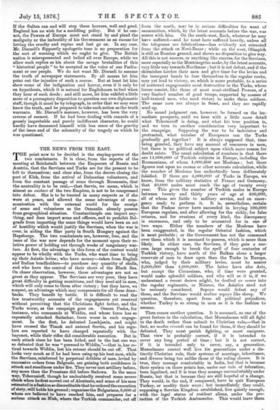TOPICS OF THE DAY.
MIL DISRAELI AND THE BULGARIAN ATROCITIES.
i1R. DISRAELI has done himself more harm in the House of Commons by his jaunty replies in reference to the questions put to him as to the atrocities in Bulgaria, than by any escapade of his Premiership. The statements as to those awful tragedies, even if, as we earnestly hope, they may prove to be somewhat exaggerated, are not the subjects on which it is wise for an English Minister to try to raise a laugh. Mr. Disraeli, on Monday, not only attempted this, but succeeded ; and yet even those who gratified him by laughing at his cynical reference to " the historical people who seldom resort to torture, but usually terminate their connection with culprits in a more expeditious manner," must have felt, as we believe that the great majority of his own party felt, the deepest mortification at the light way in which he endeavoured to gloss over the hideous stories related by the Constantinople corre- spondent of the Daily News, in its impression of last Saturday. " Wars of insurrection," said Mr. Disraeli apologetically, " are always atrocious. These are wars not carried on by regular troops,—in this case, not even by irregular troops,— but by a sort of posse comitatus of an armed population. We know in our own experience that one of our colonies, an ancient colony of England—Jamaica--was the scene of trans- actions and of a panic, which always accompanies insurrection, which no one can look back upon without horror." We should be the last to look back upon that reign of so-called " martial law " in Jamaica to which Mr. Disraeli refers " without horror." At a time when a great part of the Conservative and some even of the Liberal Press were contending, Mr. Disraeli certainly not protesting, that the Governor of Jamaica ought to be eulo- gised and rewarded for all he had done, we were amongst those who held that he had compromised the honour of the British Government by acts of timid violence and a cul- pable failure of political magnanimity. But there was, in that case, at least the excuse of the vast superiority of the negroes in numbers, and the great distance of the Government from effectual armed help. In this case there was no such excuse. The armed Mahommedans were far more than a match for the Christians against whom they were pitted, and more armed help was close at hand whenever they wanted it. Besides, if the accounts we have received are true, it was not the dangerous men capable of bearing arms who chiefly suffered, but the helpless women and children. Could the girls who were, according to the statement, first outraged and then burnt alive in a barn near Kalifer, have struck panic into the Mahommedans who are accused of that hideous deed ? The accusations of like horrors made, are so full of detail, and so vari- ously authenticated by letters from different persons residing in the neighbourhood of Philippopolis, that it is hardly possible that all of them should be untrustworthy. We are told, for instance, that about a hundred of the inhabitants of the large town of Kar- lovo have had their houses pillaged, and their wives and daugh- ters ravished ; that over sixty villages in the same district have been burnt ; indeed, the individual towns are mentioned where atrocities of peculiar horror have taken place, as, for instance, Peroushtitza, for the massacre of which place Reschid Pasha was responsible, Koprishtitcha. and Bazardjik ; and the dates of the massacres are given too. In various cases, we are told that the younger girls were sold to the highest bidder for a few francs. These are not the deeds of people inspired by the panic with which the insurrection of the many infects the few. On the contrary, they are the deeds of a brutal and unscrupulous caste, sure of its superior force of arms, and determined to make its power felt by the inferior race in any way in which it will inspire the deepest terror, and be most likely to prevent any assertion of independence for the future. And when Mr. Disraeli says that the historical" people of whom he speaks does not usually apply torture, but uses " more expeditious " means, he is using torture in a very limited sense. No people, historical or otherwise, has been more in the habit of applying the kind of torture which consists in outraging women, and then putting them to death,— whether by fire or the sword they probably do not care one straw,—than the Turks. Yet what torture can be worse for the victims, or half as bad for the survivors ? The wheel and the rack, frightful as they are, are merciful instru- ments, compared with the brutalities of Turks intent on spreading panic through a subject population. Again, Mr. Disraeli tries to exonerate the Turkish Government from all re-
sponsibility for these horrors, by speaking of them as done by neither regular nor irregular troops, but by a sort of posse comitatus of an armed population. If there be any truth at all in the accounts which the Daily News' correspondent con- firms by so many different letters, written on different days, from different places, and some of them published without contradiction in Turkish newspapers at Constantinople, nothing is more certain than that the Turkish troops, commanded by the regular authorities of the district, were guilty of some of these massacres ; and that in mahy other cases the authorities had full power to prevent them, and deliberately refused to do so. In fact, the organised effort to intercept the letters from the pro- vinces detailing these frightful scenes, was, if the Daily News' correspondent can be trusted for anything, equivalent to an official admission that these accounts were regarded as true, and could not be contradicted, so that the only course open to the authorities was to get them as far as possible suppressed. All the accounts seem to concur that at least 12,000 innocent persons, not insurgents,—some put the minimum at 25,000,— have lost their lives, and many of them what was more than their lives, in this reign of terror. And yet Mr. Disraeli com- pares these horrors with the atrocities in Jamaica, and talks of them as the natural consequence of a diffused panic, which in this case certainly no more existed among those who were re- sponsible for them, than a panic can be said to prevail amongst harriers when a hare is found. We should warn our readers that the estimate of the number of victims we have given is very possibly far short of the truth. The Times' correspondent, whose evidence is of a nature to support completely that of the Daily News, asserts that a hundred towns have been destroyed, instead of sixty ; that " at least 25,000 unarmed and inoffensive people have been massacred in cold blood," and "according to the Turkish papers of Constantinople, at least 40,000 ;" and that more than " 1,000 Bulgarian children have been taken and sold as slaves ;" nay, that in addition to all these numbers, 10,000 Bulgarians are now in prison, and are undergoing tortures such as have not been known in
Europe since the middle-ages." Mr. Disraeli's criticism on the last item of information, that it is very unlikely the prisons could hold such a number, is, for him, a singularly ignorant one. He should know enough of the East to know that prisons are not there regular gaols, but any buildings whatever seized on by the Government for the purpose of securing prisoners. Indeed, no Eastern Government,—not even our own in India,—would ever find the least difficulty in packing ten thousand prisoners, or a much larger number, in a disturbed district, into caravansarais or other buildings which would answer the purpose. Does Mr. Disraeli suppose that the Turkish Government would scruple at turning any one out of his house, if they wanted the house for the ostensible purpose of quelling an insurrection ? We think it exceed- ingly likely that the telegram received by the Daily News of Thursday, from its special correspondent at Belgrade, to the effect that, in the same district where so many of these horrors have happened, the district of Bazardjik, the Bashi-Bazouks have paraded cartloads of heads of murdered women and children, and that young women are now re- gular articles of traffic, being sold publicly in the villages by the Turks, hardly exaggerates the facts. The Turks are evidently intending to terrorise the disloyal provinces,
and nothing could be more terrifying than the public osten- tation of their willingness to massacre women and children.
Of course, the extent of these horrors may have been exagger- ated by the European press generally, which is tolerably unani- mous on the point. The most faithful of literary men cannot see everything with their own eyes, and horrors of this sort are always beheld through a natural magnifying-glass of dread and tears. But any one who should share Mr. Disraeli's hope that there has been nothing worse than the bloodthirstiness caused by panic in dealing with a formidable armed insurrection, would either be " making-believe very much," or else be too inordi- nately sanguine to deserve to have his judgment even taken into account.
This being the case, we do not scruple to say that it is a national calamity,—almost a national disgrace,—to have a Prime
Minister who treats such evidence in such a way. These massa- cres have probably been on a scale, and accompanied by details of horror, which would call for forcible European intervention, if they do not come to an end immediately. Nothing could be more disgraceful to Europe than to permit such scenes,—once verified as true,—to be repeated ; and the Turkish Government should be called very sharply to account indeed for per- mitting them, if prompt intervention is not to be insisted on.
If the • Sultan can and will stop these horrors, well and good. England has no wish for a meddling policy. But if he can- not, the Powers of Europe must not stand by and plead the malignity or the imbecility of his Government as an excuse for letting the cruelty and rapine and lust go on. In any case, Mr. Disraeli's flippantly apologetic tone is no preparation for the sort of warning which we ought to give. The British nation is misrepresented and belied all over Europe, while we allow such replies as his about the savage brutalities of this " historical people " to be accepted as the voice of our Parlia- ment or our people. We do not want Mr. Disraeli to assume the truth of newspaper statements. By all means let him point out the injustice of such a course. But at least let him show some of the indignation and horror, even if it only be on hypothesis, which it is natural for Englishmen to feel when they hear of such deeds ; and still more, let him exhibit a little more of a peremptory disposition to question our own diplomatic staff, though it must be by telegraph, in order that we may soon know the truth, and be prepared to take such action as the truth warrants. Mr. Disraeli's manner, however, has been the very reverse of earnest. If he had been dealing with canards of a grossly improbable and purely indifferent character, he could hardly have demeaned himself with less sense of the gravity of the issue and of the solemnity of the tragedy on which he was questioned.































 Previous page
Previous page